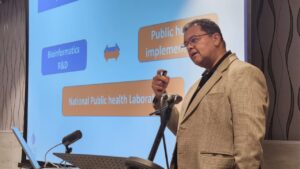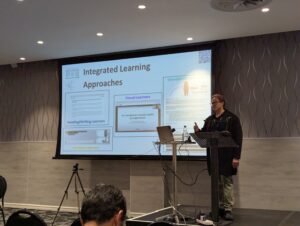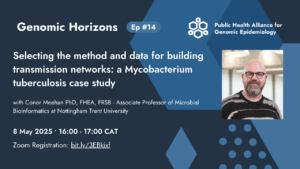(REFERENCE: PHA4GE/2024-01)
Closing date for applications: 22 March 2024
The Public Health Alliance for Genomic Epidemiology (PHA4GE) (www.pha4ge.org) is a global consortium established in 2019, to ensure a rapid global genomic-driven public health response to disease outbreaks. Our community includes members and stakeholders such as funders, academic and industry scientists, and public health organizations at international, regional and national levels; as well as non-specialist individuals across the world. The consortium has different Working Groups that are made up of representative individuals, from the growing list of over 30 partner organizations. These Working Groups drive various activities to fulfil the consortium’s mission. Our mission is to establish global consensus on data standards, document and share best practices, improve the availability of critical bioinformatic tools and resources and advocate for greater openness, interoperability, accessibility and reproducibility in public health bioinformatics.
Section A: Application Process
1. Overview
Public Health Alliance for Genomic Epidemiology (PHA4GE) is calling for proposals for up to ten (10) sub-grants with a total value of USD 50,000 (USD 5,000 each) to assist work in bioinformatics and wastewater environmental surveillance (WES) of pathogens within low- and middle- income countries (LMICs) in Africa, South Asia, and Latin America. This encompasses the testing and co creation of data standards for WES developed by PHA4GE.
1.1 Background
This sub-grant is intended for public health and research labs in LMICs that have performed pathogen genomic surveillance of wastewater. PHA4GE has developed a standardized wastewater contextual data specification to better capture and harmonize wastewater-based genomic surveillance data across labs, systems and datasets, in order to improve interoperability (https://github.com/pha4ge/Wastewater_Contextual_Data_Specification). Contextual data consists of the sample metadata, as well as environmental conditions and measurements, methods (including processes like assembly/consensus generation, quality control and de-hosting of read data), and provenance information needed to attribute, analyze, and make sense of the sequence data. PHA4GE implements the data standard via a public health data harmonization tool called the DataHarmonizer to enable data collection, curation and validation. PHA4GE has also developed instructional material (i.e. reference guides and a curation standard operating procedure (SOP)) to support proper use of the standard.
The goal of the project is to test the specification package to ensure its utility and usability for information capture in different settings, for different kinds of samples, sampling strategies, and methods.
It is anticipated that the testing will not take more than 20 hours of work (Note: Actual person hours will depend on the participant). Feedback on the specification package to PHA4GE would be expected within one month of the distribution of materials to participants.
1.2 Funding Opportunity Description
Funding scope: The aim of this award is to put data standards into practice to better facilitate the harmonized capture of the contextual data pertaining to genomics-based surveillance of wastewater environmental samples. Teams will work with PHA4GE to test and provide feedback on the WES specification package. While we hope that these awards catalyze the uptake of data standards to facilitate wastewater genomic surveillance data collection, harmonization, integration and analyses, the purpose of the award is to solicit
feedback on the data standard. As such, steps to testing and providing input on the specification are:
- Laboratories with wastewater genomics contextual data will familiarize themselves with the specification, data collection tools and curation guide
- Laboratories will attend a curation training session
- Laboratories will curate their contextual data using the provided fields, terms and formats, and assess i) the ease of use of the tools, ii) the coverage of needed/desired vocabulary, iii) identify any missing data elements.
- Laboratories will complete the feedback form and submit it to PHA4GE by the deadline.
- Laboratories will discuss their results with a PHA4GE representative for the purposes of improving the specification
Note: No data need be shared with PHA4GE, only information about the performance of the data standard, tools, and support materials during the curation exercise.
1.3 Objectives
Awardees will work with PHA4GE to:
- Improve the WES data standard, tools, and support materials via testing and providing feedback
- Demonstrate global utility, community development, and co-creation of genomic surveillance specifications
1.4 Deliverables
Awardees will:
- Attend a training workshop
- Use the tools and standards to curate at least 10 different sample types (representing different materials, sites, geographical locations, etc.)
- After testing, complete the provided feedback form
- Participate in a debriefing session regarding their experiences in the project, and suggested feedback
Section B: Submission of Proposals
2.1 Please complete the PHA4GE Sub-grants Application Form that is attached to this request for proposals.
2.2 All submissions should be submitted as a single .pdf file to the PHA4GE Secretariat at the following email address: [email protected]. Please use the following subject line: Application for Bioinformatics sub-grant (PHA4GE/2024-01)
2.3 Incomplete proposals and/or submissions will not be reviewed.
2.4 All applicants will be informed within thirty (30) days after the closing date.
Closing date for applications: 22 March 2024
For any assistance or queries relating to finalizing and submission of this application, please email us at [email protected]



